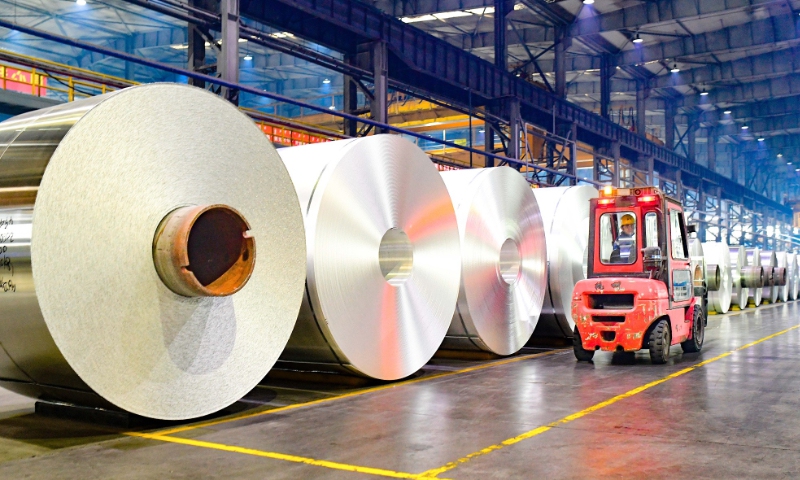
Operations are underway on the high-end aluminum foil production line at Inner Mongolia Liansheng new energy materials Co., Ltd., Tongliao, North China's Inner Mongolia Autonomous Region on February 19, 2023. Photo: VCG
The US' additional tariffs on all US steel and aluminum imports went into force on Wednesday, drawing harsh criticism and even swift retaliation from some of its major trading partners, including China, the EU and Canada, according to official statements and media reports.
"What the US did severely violates the WTO rules, harms the rules-based multilateral trading system, and does no good to solving problems," Mao Ning, a spokesperson for the Chinese Foreign Ministry, said at a regular press briefing on Wednesday when asked how China would respond to the US tariffs. "China will take all necessary measures to defend its lawful rights and interests."
In response to a separate question about whether China feels it has had adequate communication with the US administration, particularly on trade and other economic issues, Mao said that China believes that the right way is to address each other's concerns through dialogue and consultation on the basis of equality and mutual respect.
"Cooperation will bring about mutual benefit and win-win, and China will definitely take countermeasures in response to arbitrary pressure," Mao said.
China has previously launched countermeasures against the US' imposition of additional tariffs on Chinese products, including additional tariffs of up 15 percent on certain US products, which took effect on Monday.
The US' tariffs on steel and aluminum also prompted retaliation and criticism from some of its biggest trading partners and traditional allies on Wednesday.
The European Commission (EC), the executive body of the EU, announced counter tariffs on US goods worth up to 26 billion euros ($28.4 billion), "matching the economic scope of the US tariffs," according to an official statement on the EC's website.
EC President Ursula von der Leyen said that the bloc "deeply regrets" the new tariff measures, warning that they are "bad for business, and even worse for consumers."
Canada, the biggest foreign supplier of steel and aluminum to the US, also indicated possible responses, with Minister of Energy and Natural Resources Jonathan Wilkinson suggesting that Canada could impose non-tariff measures such as restricting its oil exports to the US or levying export duties on products if a trade dispute with the US escalates further, according to a Reuters report.
Australian Prime Minister Anthony Albanese also criticized the US' tariff decision as "entirely unjustified." He cautioned that tariffs and escalating trade tensions could trigger "slower growth and higher inflation," describing them as a form of economic self-harm, according to Australia's ABC News.
The swift and powerful reactions from major US trading partners underscored the growing opposition to the US' protectionist and unpredictable trade policies, which not only undermine global trade but will also hurt the US itself, according to Huo Jianguo, a vice chairman of the China Society for World Trade Organization Studies in Beijing.
"The policy flip-flops by the US are adding uncertainty to global markets and could hurt its own economy, leading to stock market declines and inflationary pressure," Huo told the Global Times on Wednesday. "The uncertainty would lead to negative global expectations for the US economy and put additional pressure on it."
US stocks experienced a punishing drop this week, with the S&P 500 briefly falling into correction territory on Tuesday, as uncertainty over the US' tariffs exacerbated worries about economic growth, Reuters reported on Wednesday.
Meanwhile, Li Yong, a senior research fellow at the China Association of International Trade, said that the additional tariffs will not help boost the US' steel and aluminum industries.
"The steel and aluminum industries in the US suffer from inefficiencies and outdated technologies - problems that cannot be solved simply by raising tariffs. Instead, tariffs merely protect these lagging enterprises by reducing competitive pressure without enabling their development," Li told the Global Times on Wednesday.




